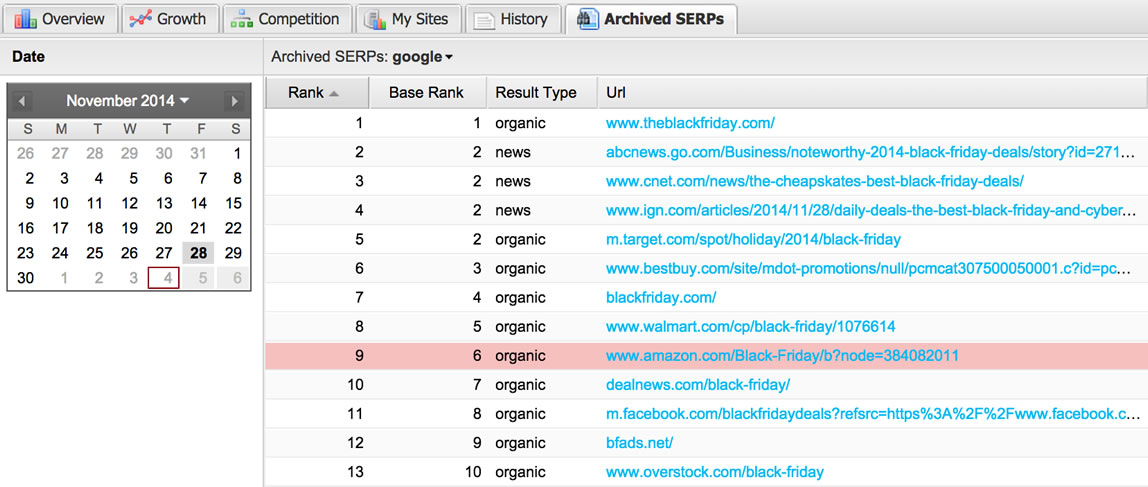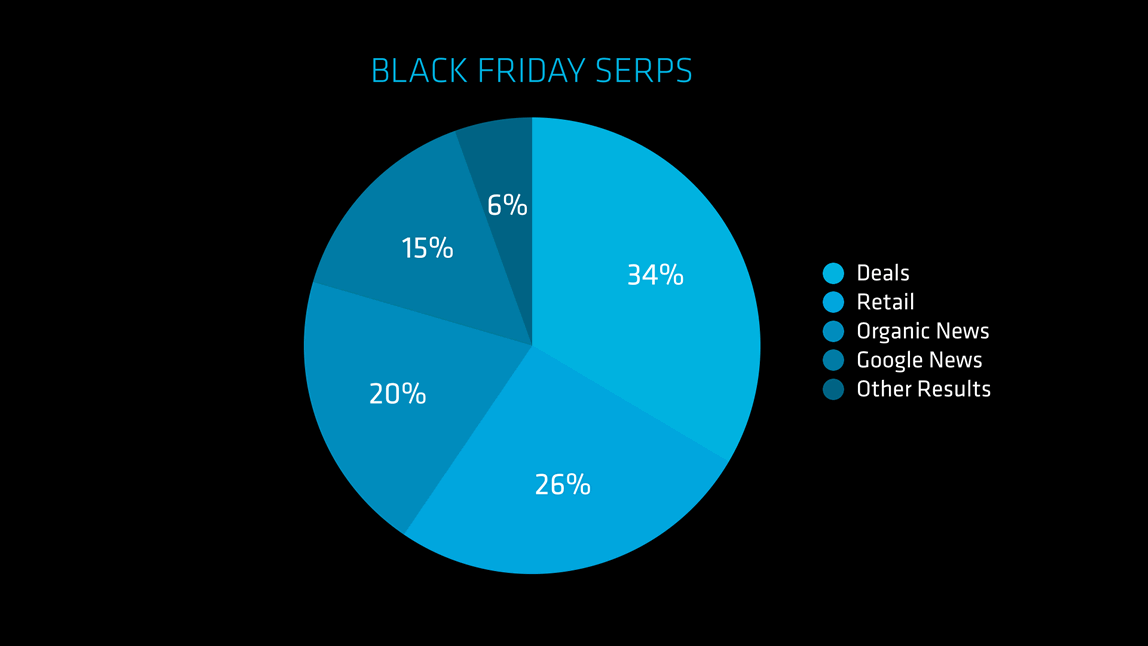On the USA’s busiest shopping days, we dipped into our massive archive of retail SERP data and found some unexpected contenders.
Ask an online retail leader like Amazon who they’re going toe-to-toe with for top rankings during Black Friday and Cyber Monday, and they’ll probably list off Best Buy, Walmart, Target, and other large retailers with an e-commerce focus.
But the gang here at STAT wanted to take a data-driven approach to answer this question. We decided to find out who exactly is jockeying for position against the retail giant during the busiest shopping days in the United States.
For the last month, as a part of a larger research project into retail SEO, we’ve been tracking around 630,000 local SERPs every day across the US.
That includes 3,800 keywords for Black Friday and 2,885 for Cyber Monday on desktop and mobile devices in the five largest US cities by population:
- New York
- Chicago
- Houston
- Philadelphia
- Los Angeles
That’s a torrent of data, so in the interest of stopping this post from turning into a thesis (and from boring you to death), we zoomed in on a narrower subset.
Going in for a closer look
First, we identified our top five keywords for both Black Friday and Cyber Monday based on Google Global Average Search Volume.
[Black Friday] 1,000,000
[Black Friday 2014] 201,000
[Black Friday Deals] 201,000
[Black Friday Ads] 135,000
[Black Friday Sales] 60,500
[Cyber Monday] 368,000
[Cyber Monday Deals] 246,000
[Cybermonday] 33,100
[Best Cyber Monday Deals] 27,100
[Cyber Monday Sales] 22,200
Next, we decided to zoom in on a single city: Chicago. Selected because of my love of deep dish pizza and affinity for Chicago house music. (Science!)
For each keyword, we combed through STAT’s complete archives of desktop and mobile SERPs for November 28 (Black Friday) and December 1 (Cyber Monday).
Deep SERP archives
STAT retains full historical SERPs for researching trends and seasonality.
We categorized and tallied every site in the top 20 positions (including Google’s universal results), giving us a breakdown of sites by category. (Results between smartphone and desktop were practically identical, so we didn’t break those out.)
Some surprising SERP competition
You can see that “deal” websites are the majority of search results for Black Friday, making up 34%. These are coupon sites, flyer sites, and other aggregated content or jump sites.
Black Friday search results
Various news sites edge out retailers in the SERPS.
Retailers (including Amazon) come in second, holding onto 26% of the results, followed by organic news with 20%. But when you combine Google’s blended news box (15%) with the organic news results (20%), news stories make up to 35% of the top 20 results, bumping news stories into the top position.
The trend carries over to Cyber Monday. But here organic news is the front-runner, making up a whopping 37% of the top 20 results. Combine that with Google’s blended news box (15%), and you’ve got news stories making up 52% of the search results for Cyber Monday keywords. That’s over half the top results!
Retailers, including Amazon only hold 30% of the top 20, followed by deal sites with 15%.
Cyber Monday search results
In this case, news results completely dominate over retailers in the SERPs.
What’s making headlines?
The majority of ranking news sites were reporting on where to find the best deals for Black Friday and Cyber Monday. With headlines like “The Best Black Friday Deals in Tech” and “All of the Cyber Monday Deals You Need to Know About,” the sites most featured were Forbes, ABC, CNET, USA Today, The Verge and MTV News.
We all know there are twice as many ranking factors for a Google top position as there are dollars in Larry Page’s bank account. But speculation would lead us to believe these news sites are ranking well because of an established readership and the fresh and timely content that people share on a regular basis through various channels.
What does this mean for SEO?
Once SEOs have identified that news is making up a significant portion of these SERPs, they can work strategically with marketing, content, and PR teams to create and share relevant and quality content with the highest-ranking news sites that are likely to cover Black Friday or Cyber Monday stories.
It’s possible to re-route some of that organic traffic that’s lost to news sites by feeding them timely news releases, exclusive shopping tips or specials for readers, and blog posts focusing on “top deals” or “best of” lists (all with links, of course).
In addition, retailers can always look at purchasing ads on the top-ranking news sites to round out the overall strategic efforts.
So in short, it doesn’t matter if you’re a small, local retailer or an online giant like Amazon. If you understand what’s going on in the SERPs, you’ll be able identify the real competition, and take steps towards clawing back that traffic.





